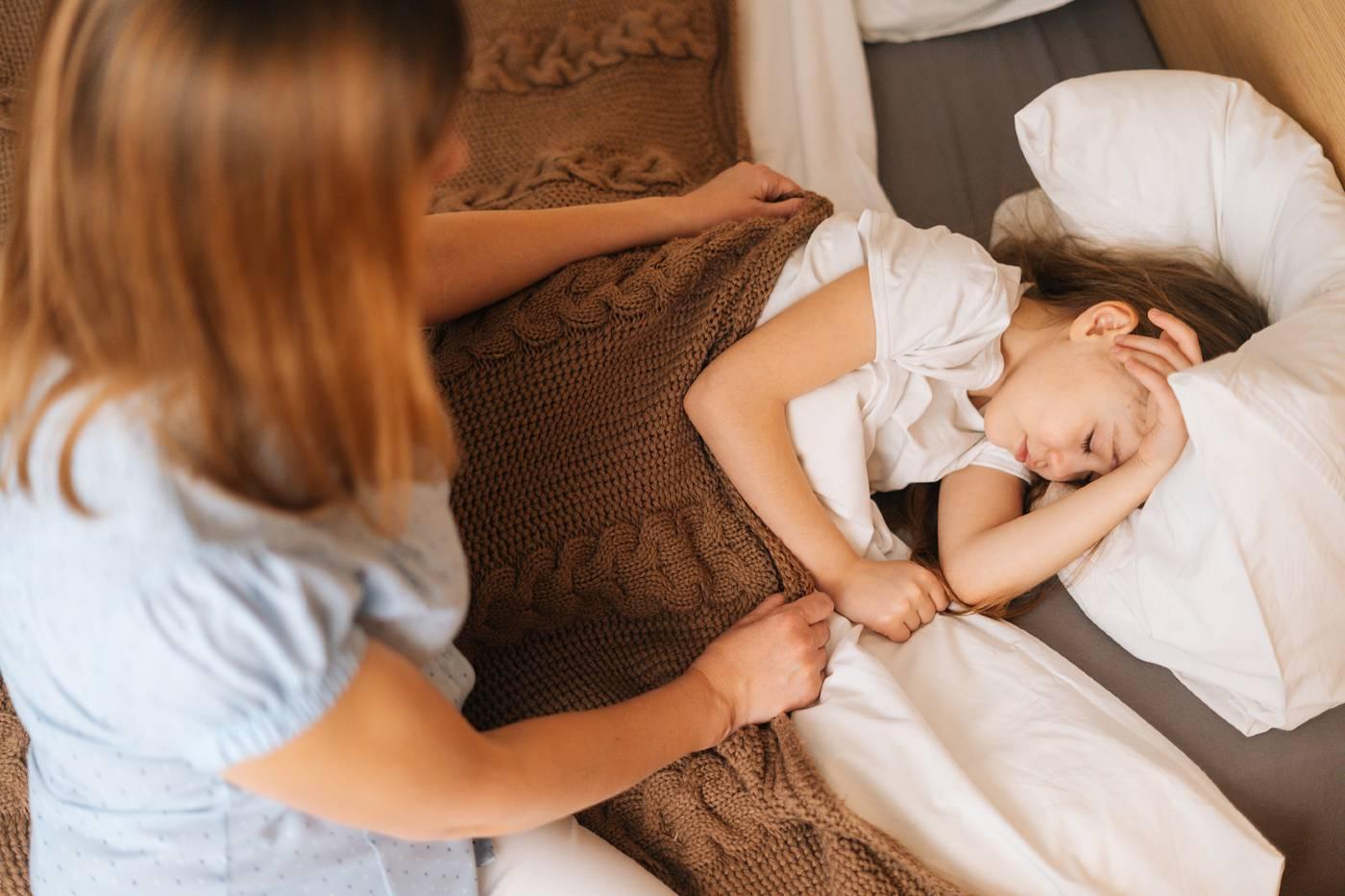TODDLER
What Causes Night Seizures in Toddlers?
Her's why some children experience night time convulsions.

Written by
Dr. Harvey Karp

Seizures, no doubt, are scary to witness. But did you know that they’re actually fairly common in infants and young children? It’s true…and seizures (also called convulsions) have a wide range of causes. Here’s what you need to know about childhood seizures.
What is a seizure?
A seizure occurs when the brain temporarily short circuits, possibly causing uncontrolled body jerks, an inability to communicate, and unintended urination...but some seizures don’t have any outward signs. A seizure won’t necessarily harm your toddler’s brain, but some seizures can cause damage.
Why does my toddler twitch in their sleep?
Your toddler twitching while asleep may be startling—but there’s nothing to worry about. Toddlers twitching (or babies twitching) their little arms, legs, eyelids, or cheeks in their sleep is common…and it has nothing to do with dreaming. Instead, twitching during rapid eye movement (REM) sleep is believed to be linked to sensorimotor development in babies and toddlers. (PS: Babies move through their sleep cycles very fast, which means they enter REM sleep, aka “active sleep” almost every hour, making them more likely to jerk and twitch…and wake up regularly.) Sleep twitching may be the brain’s way of teaching your child about their limbs and what they can do with them! Though most toddler or baby sleep twitching is to be expected, if your little one twitches or stiffens when awake, call your child’s doctor. Your child may be experiencing a seizure.
Can children have a seizure in their sleep?
Yes, children can have seizures in their sleep. In fact, it’s actually common for seizures to occur in the evening. That’s because the brain is more vulnerable to these electrical eruptions when it’s overly tired, about to enter sleep…or just waking up.
Signs of Seizures in Children
Depending on the type of seizures, children can experience a variety of symptoms. Some are easy to spot—and others are not. Common signs of seizures in children include:
- Staring
- Periods of rapid blinking
- Jerking movements, especially arms and legs
- Stiffening of the body
- Loss of bladder or bowel control
- Loss of consciousness or awareness
- Very sleepy and irritable when waking in the morning
- Suddenly falling for no apparent reason
- Some children experience an aura (unusual sounds, smells, visual disturbances, a sense of déjà vu, or out-of-body feelings) just before experiencing a seizure
If your child is asleep, it may be difficult to determine if your toddler actually experienced a night seizure. Make sure to consult with a medical professional if you have any concerns that your child is suffering from seizures or night seizures.
What’s a febrile seizure?
Febrile seizures are convulsions in young children triggered by a fever higher than 101 degrees Fahrenheit. (In some cases, the fever arrives a few hours after the seizure.) Febrile seizures are for-sure scary, causing young children to lose consciousness and have rigid limbs that shake uncontrollably. But the episode usually lasts for just a few minutes and doesn't cause any long-term health issues. (At times, a febrile seizure can last more than 15 minutes. This prolonged childhood seizure is still considered relatively harmless but can increase a child’s chance of developing epilepsy.) Febrile seizures are the most common type of childhood seizure, with up to 5% of American children experiencing a febrile seizure before age 5 and 2-year-olds being at the greatest risk.
What causes seizures in children?
Aside from fever, there are a variety of triggers—from diseases to injuries—that might cause a child to have a night seizure. Some common causes include:
- Head injury. A moderate to severe head injury may cause a seizure within minutes of getting hurt…or the seizure may occur after a week’s time.
- Medication. Research shows that antidepressants (specifically bupropion aka Wellbutrin) are a common medication responsible for pediatric drug-induced seizures.
- Poisoning. For example, ingesting star anise, perfume, mouthwash, hand sanitizers, and more can cause poisoning that may result in seizures.
- Neurologic disorders. Rett syndrome, Angelman syndrome, Tuberous sclerosis, and Sturge-Weber syndrome have all been known to cause childhood seizures.
What about epilepsy?
Epilepsy is a medical condition that impacts about 1% of all children. Most children with epilepsy outgrow it by adulthood. Childhood epilepsy falls into two main categories: focal (aka partial seizures) and generalized.
- Focal Seizures: These types of seizures start in one small region of the brain and can be caused by head trauma, stroke, infection, tumors, or an underlying structural abnormality in the brain. Here, symptoms can include behavior, thinking, or movement changes.
- Generalized Seizures: These types of childhood seizures involve both brain hemispheres and are often thought to be genetic. You might notice your child blinking and staring, their limbs may stiffen, and their whole body may jerk.
What type of epilepsy causes night seizures?
There are a few different types of childhood epilepsy that occur at night, during sleep, cause night seizures, including:
- Benign rolandic epilepsy (BRE). Also called benign focal epilepsy of childhood, this is one of the most common types of epilepsy, accounting for more than one-third of all epilepsy cases. BRE can start as early as age 3, although it usually doesn’t begin before kids are 5. These night seizures are often overlooked for a long time because they happen during sleep. But once the diagnosis is suspected, parents often report that their kids have been sleeping less, exhausted during the day, and experiencing night terrors, and sleepwalking for weeks or months. Fortunately, the seizures cause absolutely no serious health problems and disappear by the teen years.
- Frontal lobe seizures: This is the second most common form of epilepsy. Depending on exactly the part of the frontal lobe involved, your child may experience night waking, thrashing, and/or bicycling movements of their legs or arms.
- Landau-Kleffner syndrome: This rare disorder, also dubbed acquired epileptic aphasia, causes infrequent nighttime seizures and impacts a child’s ability to speak and understand speech. The disorder can come on gradually or all at once, impacting children aged 3 to 7
What do I do if my child has a night seizure?
It’s very important to see a doctor as soon as you can after your child’s first seizure—even if it only lasts a few seconds. However, if the seizure lasts longer than five minutes, get to the emergency room, stat. It’s also imperative to get to the ER if your child is…
- Vomiting
- Has a stiff neck
- Experiencing breathing issues
- Extremely sleepy
The diagnosis of seizures requires a full medical evaluation, including a neurological exam and sleep EEG (electroencephalogram) to record the electrical activity in the brain. Sometimes the EEG may be normal, so the doctor may order an ambulatory EEG, which records up to 72 hours of brain activity with a special recorder. Other tests, like MRI and/or CT scans may be in the cards, as well. Some children don’t need any treatment at all, while others benefit from taking an anticonvulsant drug.
More on childhood sleep disturbances:
- Dr. Harvey Karp’s Guide to Kids Snoring
- Why Toddlers Grind Their Teeth & What to Do About It
- What is Restless Sleep Disorder in Kids?
- Help Your Child with ADHD Sleep Better
Disclaimer: The information on our site is NOT medical advice for any specific person or condition. It is only meant as general information. If you have any medical questions and concerns about your child or yourself, please contact your health provider.
SHARE THIS ARTICLE
MOST LOVED
Sleepytime Sidekicks












